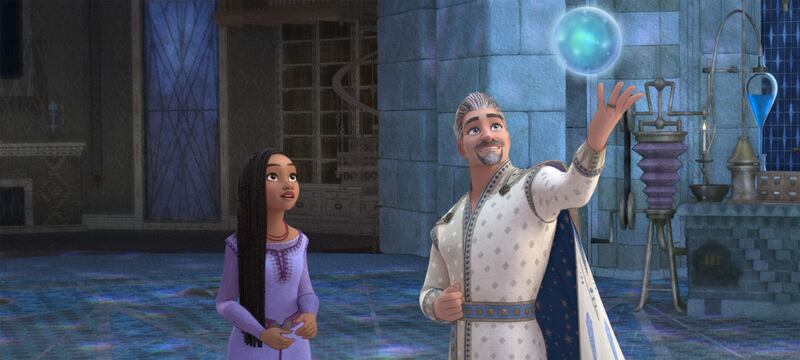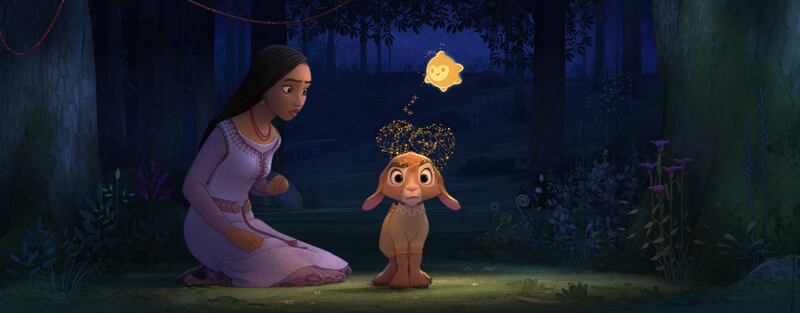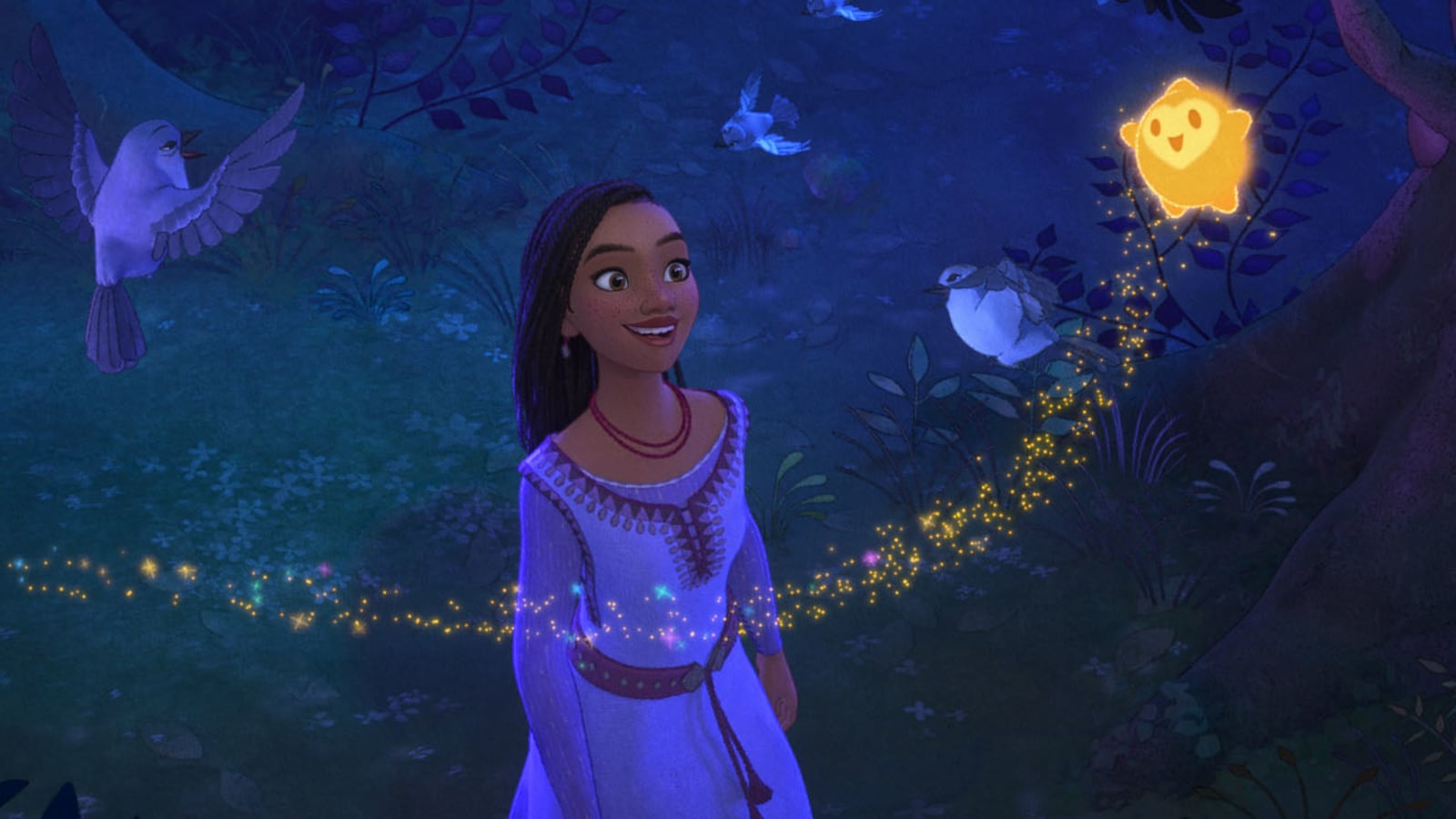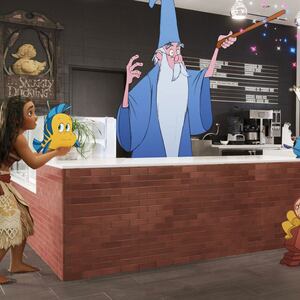It should come as no surprise that the Walt Disney Company is celebrating its 100th birthday with a fairy tale. Wish (in theaters Nov. 22) opens with the cracking of a leather-bound tome—a framing device that immediately positions the studio’s latest animated feature within a long line of adventures that either were or could have been pulled from a storybook. Will the movie cling to Mouse House tradition? Or will it subvert this history like Shrek, a Disney-skewering cartoon comedy that also began with the turning of pages? In the aftermath of Frozen, there’s no reason Disney can’t have its cake and eat it too.
Turns out that the storybook prologue has a dual function. It also gives the filmmakers a head start on explaining the rather convoluted rules that govern their bedtime story. More exposition arrives in the form of the introductory this-is-my-town number sung by earnest teenager Asha (Ariana DeBose). It may be the only song of its kind whose lyrics include a Q&A session. Later, Asha will bust out a second book to illustrate the plot to another character. Even she gets lost at one point, stuttering out a relatable “I’m just not sure how this works.” You don’t either, huh?

Asha, a textbook twinkly-eyed striver with big dreams and the Disney-standard baggage of a dead parent, lives in a quaint seaside kingdom called Rosas. The town is ruled by Magnifico (Chris Pine), a sorcerer who collects a single wish from each of his subjects, who then promptly forget what they asked for. Once a year, King Magnifico uses magic to grant one of those wishes, which he stores in his prototypical Disney castle in little glowing, buoyant orbs. (Got all that?) At the start of Wish, Asha is angling to make like Mickey Mouse before her and land the coveted position of sorcerer’s apprentice. Any parents concerned that there will be nothing for them in this kids’ movie can rest assured that it’s very attentive to the anxiety of a big job interview.
If a benevolent monarch worshiped by his people sounds a little last century, you’re getting ahead of the movie. Wish’s creative team includes co-director Chris Buck and co-writer Jennifer Lee, two of the people responsible for the Frozens and their faintly progressive tweaks to Disney Princess protocol. Here, they cast suspicion on the royal sympathies of typical fairy tales. Suffice to say, Magnifico is not as benevolent as he seems; he’s more of a preening narcissist, dangling the empty promise of fulfilled wishes over the townsfolk’s heads.
He has no intention, for example, of granting the simple, pure wish of Asha’s grandfather (Victor Garber), who wants only to inspire his neighbors. (That this kindly old dreamer is exactly 100 years old might give you a sense of who he’s meant to represent.) Disillusioned with everything she learns about her king, Asha does what Jiminy Cricket told Pinnochio to do and directs a wish to the stars instead. Her big “I Want” number summons a literal star—a cuddly, nonverbal celestial critter who brings some madcap mischief to Rosas, granting all the local wildlife the ability to speak. That’s right: The movie introduces an entirely different form of wishing around the start of the second act. You half expect Asha to stumble upon a magic lamp, just for brand synergy purposes.
Wish has all the polish you could want or expect from the world’s leading cartoon factory. It pleasingly combines the sleek standards of modern computer animation with a faux-watercooler look that vaguely evokes the studio’s canonized hand-drawn classics. At a very glance, you can see the alchemy of the film’s design: its attempt to once more hit that Frozen sweet spot between old-fashioned and 21st-century. (No wonder they cast DeBose, Oscar-winning star of West Side Story, the Steven Spielberg musical that already looks like a new platonic ideal of classically modern mythmaking.) This movie is nice to gawk at, though the character models of Disney films are starting to get a little too interchangeable, a little too… well, on model.

But as a piece of storytelling, Wish is as flimsy as a star decal stuck to a wall. It’s high on complicated magical rules and low on genuine magic. The songs by Dave Metzger, Benjamin Rice, and Julia Michaels are tuneful but forgettable—little pep talks for the characters and audience alike, generic anthems of validation and inspiration only marginally improved by some world-music instrumentation. There’s nothing on the soundtrack likely to get heavy airplay in the mini-van, nothing that competes with the earworms of Frozen or Moana or Encanto, to say nothing of the Disney Renaissance songbook.
The characters are thin, too. DeBose has the pipes for Disney heroine duty, but her Asha is all plucky virtue. And the film takes a quantity-0ver-quality approach on the sidekick front, dispersing unfunny banter across a supporting cast that includes a newly talking goat (Frozen’s Alan Tudyk), a bunch of teenage friends supposedly modeled on Snow White’s seven dwarves, and a whole forest of chatterbox animals presumably introduced to add more plush toys to The Disney Store. The only true personality here belongs to the villain, a shady politician with the self-regard of Gaston and the cockiness of David Blaine. Pine does a nice job teasing out his arrogance from his charm, so it’s not impossible to see why Asha would initially fall under the sway of his celebrity.
Wish feels like it never quite got out of the outlining stages, like some executive wrote “wish” on a whiteboard, and a movie was just kind of built around it. The uplifting ideals and anniversary motifs barely cohere into a story. If there’s a moral here, it’s something about not counting on others to realize your dreams for you—a rather ironic point for a self-proclaimed dream factory to make during its centennial celebration. At one point, it’s revealed that some of the unfulfilled desires the bad guy keeps locked up are basically the plots of old Disney movies… you know, like the ones that used to enter a “vault” for years on end, becoming inaccessible to the public. It took 100 years, but maybe Disney is starting to look into that mirror, mirror on the wall.







